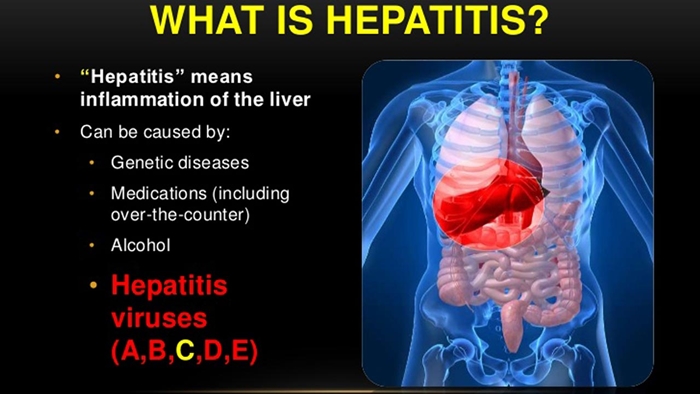Hepatitis

|
Hepatitis refers to an inflammatory
condition of the liver. It’s commonly
caused by a viral infection, but there
are other possible causes of hepatitis.
These include autoimmune hepatitis and
hepatitis that occurs as a secondary
result of medications, drugs, toxins,
and alcohol. Autoimmune
hepatitis is
a disease that occurs when your body
makes antibodies against your liver
tissue. |
|
Your liver is located in the right upper area of your abdomen. It performs many critical functions that affect metabolism throughout your body, including:
According to the Treatment options vary depending on which type of hepatitis you have. You can prevent some forms of hepatitis through immunizations and lifestyle precautions. Viral infections of the liver that are classified as hepatitis include hepatitis A, B, C, D, and E. A different virus is responsible for each type of virally transmitted hepatitis. Hepatitis A is always an acute, short-term disease, while hepatitis B, C, and D are most likely to become ongoing and chronic. Hepatitis E is usually acute but can be particularly dangerous in pregnant women. Hepatitis AHepatitis A is caused by an infection with the hepatitis A virus (HAV). This type of hepatitis is most commonly transmitted by consuming food or water contaminated by feces from a person infected with hepatitis A. Hepatitis BHepatitis B is transmitted through contact with infectious body fluids, such as blood, vaginal secretions, or semen, containing the hepatitis B virus (HBV). Injection drug use, having sex with an infected partner, or sharing razors with an infected person increase your risk of getting hepatitis B.
It’s estimated by the Hepatitis C
Hepatitis C comes
from the hepatitis C virus (HCV).
Hepatitis C is transmitted through
direct contact with infected body
fluids, typically through injection drug
use and sexual contact. HCV is among the
most common bloodborne viral infections
in the United States. Hepatitis DAlso called delta hepatitis, hepatitis D is a serious liver disease caused by the hepatitis D virus (HDV). HDV is contracted through direct contact with infected blood. Hepatitis D is a rare form of hepatitis that only occurs in conjunction with hepatitis B infection. The hepatitis D virus can’t multiply without the presence of hepatitis B. It’s very uncommon in the United States. Hepatitis E
Hepatitis E is
a waterborne disease caused by the
hepatitis E virus (HEV). Hepatitis E is
mainly found in areas with poor
sanitation and typically results from
ingesting fecal matter that contaminates
the water supply. This disease is
uncommon in the United States. However,
cases of hepatitis E have been reported
in the Middle East, Asia, Central
America, and Africa, according to the Alcohol and other toxinsExcessive alcohol consumption can cause liver damage and inflammation. This is sometimes referred to as alcoholic hepatitis. The alcohol directly injures the cells of your liver. Over time, it can cause permanent damage and lead to liver failure and cirrhosis, a thickening and scarring of the liver. Other toxic causes of hepatitis include overuse or overdose of medications and exposure to poisons. Autoimmune system responseIn some cases, the immune system mistakes the liver as a harmful object and begins to attack it. It causes ongoing inflammation that can range from mild to severe, often hindering liver function. It’s three times more common in women than in men. If you have infectious forms of hepatitis that are chronic, like hepatitis B and C, you may not have symptoms in the beginning. Symptoms may not occur until the damage affects liver function. Signs and symptoms of acute hepatitis appear quickly. They include:
Chronic hepatitis develops slowly, so these signs and symptoms may be too subtle to notice. HygienePracticing good hygiene is one key way to avoid contracting hepatitis A and E. If you’re traveling to a developing country, you should avoid:
Hepatitis B, C, and D contracted through contaminated blood can be prevented by:
Hepatitis B and C can also be contracted through sexual intercourse and intimate sexual contact. Practicing safe sex by using condoms and dental dams can help decrease the risk of infection. You can find many options available for purchase online.
|
| Herbal remedies use to treat hepatitis | |||
|
|
|||
|
|
|
|||||||||||||||||||||||
|



